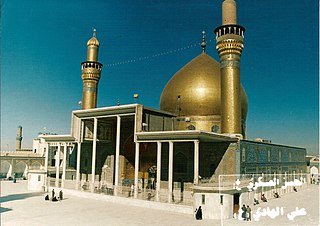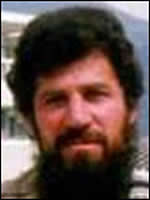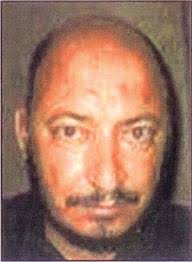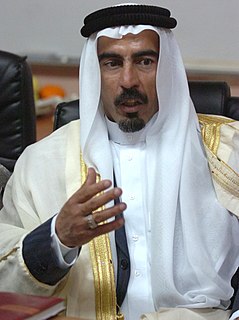Related Research Articles

Abu Zubaydah is a Palestinian national currently held by the U.S. in the Guantanamo Bay detention camp in Cuba. He is held under the authority of Authorization for Use of Military Force Against Terrorists (AUMF).

Troops for the invasion came primarily from the United States, the United Kingdom and Poland, but 29 other nations also provided some troops, and there were varying levels of assistance from Japan and other countries.

Mowaffak Baker al-Rubaie is an Iraqi politician, and was Iraq National Security Advisor in the government of Prime Minister Ayad Allawi and in 2005-2006 Prime Minister Ibrahim Al Jaafari and 2006-2009 Prime Minister Nouri al-Maliki. He was elected to the Iraqi Council of Representatives in December 2005 as a nominee of the United Iraqi Alliance and from 2014-2018 in the Iraqi Parliament.

Jama'at al-Tawhid wal-Jihad, which may be abbreviated as JTJ or Jama'at, was a militant Jihadist group. It was founded in Jordan in 1999 and was led by Jordanian national Abu Musab al-Zarqawi for the entirety of its existence. During the Iraqi insurgency (2003–11), the group became a decentralized network with foreign fighters and a considerable Iraqi membership.

An insurgency began in Iraq after the 2003 US-led invasion, and lasted throughout the ensuing Iraq War which lasted from 2003 until 2011. The first phase of the insurgency began shortly after the 2003 invasion and prior to the establishment of the new Iraqi government. From around 2004 to May 2007, the insurgency primarily targeted the Multi-National Force – Iraq, while latterly Iraqi security forces, seen by Iraqi insurgents as collaborators with the coalition, were also targeted.

The 2006 al-Askari Shrine bombing occurred at the al-Askari Shrine in the Iraqi city of Samarra, on February 22, 2006, at about 6:44 a.m. local time. The attack on the mosque, one of the holiest sites in Shia Islam, is not claimed by any group; U.S. President George W. Bush suggested that "the evidence indicates" that it was "an Al Qaida plot". The mosque was severely damaged, but no one was injured in the blast.

Abdul Hadi al Iraqi is the nom de guerre of Nashwan Abdulrazaq Abdulbaqi, an alleged senior member of al-Qaeda who is now in US custody at Guantanamo Bay detention camp in Cuba. The U.S. government alleges the man they have in custody is Abdul Hadi al Iraqi, but he claims his name is Nashwan al-Tamir. It is expected that this will be explored in the current Military Commissions proceedings.

Hibhib is a village in northern Iraq, located 8 km (5.0 mi) northwest of Baquba. It is predominately Sunni Arab.

Abu Ayyub al-Masri, also known as Abu Hamza al-Muhajir and other aliases, was the leader of Al-Qaeda in Iraq during the Iraqi insurgency, following the death of Abu Musab al-Zarqawi in June 2006. He was war minister of the Islamic State of Iraq from 2006-2010 and prime minister of the Islamic State of Iraq from 2009–2010. He was killed during a raid on his safehouse on 18 April 2010.

Hamid Dawud Mohamed Khalil al-Zawi, known as Abu Hamza al-Baghdadi and Abu Omar al-Qurashi al-Baghdadi, was the leader of the militant groups Mujahideen Shura Council, and its successor, the Islamic State of Iraq, which fought against US forces and their Iraqi allies in the Iraq War.

Abu Musab al-Zarqawi, born Ahmad Fadeel al-Nazal al-Khalayleh, was a Jordanian jihadist who ran a terrorist training camp in Afghanistan. He became known after going to Iraq and being responsible for a series of bombings, beheadings, and attacks during the Iraq War, reportedly "turning an insurgency against US troops" in Iraq "into a Shia–Sunni civil war". He was sometimes known by his supporters as the "Sheikh of the slaughterers".

The Diyala province campaign was a series of operations conducted by coalition forces against Iraqi insurgents and a number of bombing and guerrilla attacks against the security forces in Diyala Governorate of Iraq, with the purpose of control of the province.

Abdul Sattar Abu Risha – Sheikh Abdul Sattar Eftikhan al-Rishawi الشيخ عبد الستار افتيخان الريشاوي – was a high-profile Iraqi tribal sheikh of the Abu-Risha tribe. He was the leader of an alliance of Iraqi Sunni Arab tribes that opposed al-Qaeda in Iraq.

Operation Phantom Thunder began on 16 June 2007, when Multi-National Force-Iraq launched major offensive operations against al-Qaeda and other extremist terrorists operating throughout Iraq. Operation Phantom Thunder was a corps level operation, including Operation Arrowhead Ripper in Diyala Province, Operation Marne Torch and Operation Commando Eagle in Babil Province, Operation Fardh al-Qanoon in Baghdad, Operation Alljah in Anbar Province, and continuing special forces actions against the Mahdi Army in southern Iraq and against Al-Qaeda leadership throughout the country. The operation was one of the biggest military operations in Iraq since the U.S. invasion in 2003.

Al-Qaeda in Iraq or Al-Qaeda in Mesopotamia, officially known as Tanzim Qaidat al-Jihad fi Bilad al-Rafidayn or TQJBR was an Iraqi Sunni Islamic Jihadist organization affiliated with al-Qaeda, for part of the first two decades of the 21st century.
Abu Huthaifa al-Batawi was a commander in the Islamic State of Iraq (ISI) militant group and its leader in Baghdad. He was killed during an attempted jailbreak on May 8, 2011.

The Islamic State of Iraq was a militant Salafist jihadist group that aimed to establish an Islamic state in Sunni, Arab-majority areas of Iraq during the Iraq War and later in Syria during the Syrian Civil War.

Shaker Wahib al-Fahdawi al-Dulaimi, better known as Abu Waheeb, was a leader of the militant group Islamic State in Iraq and the Levant in Anbar, Iraq. He was known for killing three Syrian truck drivers in Iraq in the summer of 2013. He and three others were killed in a United States-led coalition airstrike in May 2016, according to the US Department of Defense.
The history of the Islamic State of Iraq and the Levant (ISIL) began with the group's foundation in 1999 by Jordanian Salafi jihadist Abu Musab al-Zarqawi under the name Jamāʻat al-Tawḥīd wa-al-Jihād. In a letter published by the US State Department in February 2004, Zarqawi wrote that jihadists should use bombings to start an open sectarian war in Iraq so that Sunnis from other countries would mobilize against the assassinations carried out by Shias, specifically the Badr Organisation, against Ba'athists and Sunnis. The Islamic State would eventually grow to control territory with a population of millions.
References
- 1 2 3 Agence France-Presse. Iraq's al-Qaeda number two captured. 3 September 2006.
- 1 2 3 4 5 Associated Press. Iraqi Authorities: Al Qaeda No. 2 Arrested. 3 September 2006.
- 1 2 Agence France-Presse. Iraqi Al-Qaeda leader interrogated for two months: US military. 7 September 2006.
- ↑ Oppel, Richard A. Jr. (September 3, 2006). Senior Al Qaeda Figure in Iraq Is Captured. The New York Times
- ↑ Agence France-Presse. Iraq follows Qaeda arrest with massive sweep. 4 September 2006.